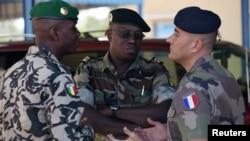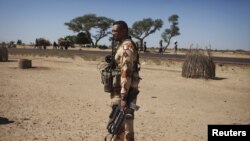DAKAR —
French strikes on al-Qaida-linked rebels in Mali have raised the risk of revenge attacks on French citizens in parts of Africa, officials say, although expatriates and foreign companies were mainly taking the threats in their stride.
French troops launched their first ground operation against Islamist rebels on Wednesday after six days of air strikes.
Mali's rebels have said French intervention would make targets of France's 30,000 citizens in West Africa and endanger the lives of the eight French nationals already in Islamist hands since a spate of kidnappings.
"French interests are threatened all over. Yes, we are worried that our interests in Bamako could be targeted by attacks,'' French ambassador Christian Rouyer told journalists on Tuesday, flanked by three bodyguards in Mali's capital Bamako.
Some of Mali's neighbors have raised security measures since the strikes, including by sending additional police on patrol and carrying out identity and bag checks at government buildings, embassies, and tourist sites.
Al-Qaida in the Islamic Maghreb (AQIM)
Ansar Dine
Movement for Unity and Jihad in West Africa (MUJWA/MUJAO)
National Movement for Liberation of Azawad (MNLA)
Boko Haram
Islamists linked to al-Qaida have been active in the Sahara for a decade. Their attacks on Western targets so far have mainly involved kidnappings, and it is not clear how capable they would be of striking far beyond the desert.
"The situation is a little bit scary, but I don't think hardcore Islamists would get much sympathy here,'' said Jeremie Thomas, a 25-year-old Frenchman sipping coffee beneath a baobab tree at a restaurant in Senegal's sleepy capital Dakar.
Four police with automatic rifles stood at the restaurant's gates and guards checked the bags of arriving clients.
Security experts said the most likely threat of revenge attacks from the Islamists in the short-term would be bombings in Mali itself, though there were also risks that sleeper cells or linked groups could strike elsewhere in Africa.
Mankeur Ndiaye, foreign minister in neighbouring Senegal, said al-Qaida sleeper cells existed in his country.
There have been reports of members of Nigeria's Islamist sect Boko Haram - which has been waging a bombing campaign in the north of that country - entering Mali via Niger, raising concerns that groups will coordinate.
A U.S. military source said an attack in Bamako or elsewhere in West Africa would be much more likely than one in France.
Vigilance
French companies, including France Telecom and Air France, said they were happy with their current security measures in West Africa and had not changed operations since the start of French bombing raids last week. Air France said its daily Paris-Bamako flight was being maintained.
French nuclear energy giant Areva - which had four employees kidnapped near its mine in Niger in 2010 - said it was monitoring the situation in the Sahel and had increased vigilance. Areva has no operations in Mali.
Elsewhere in the region, some schools catering to expatriates hardened security, including in places like Ivory Coast's main city Abidjan and in Burkina Faso's capital Ouagadougou - both foreign to Islamist violence.
"I'm worried,'' said Michel Stremez, a French businessman in Abidjan, referring to Paris's decision to intervene in Mali. "They are running the affairs of the whole world without letting us know, without asking what we think, and this could have repercussions just about anywhere.''
French citizens in West Africa have been on alert since Christmas Eve, 2006 when suspected al Qaeda militants gunned down four tourists picnicking by the roadside near the village of Aleg in Mauritania.
Those attacks triggered a scare among foreigners in the mostly Muslim former French colony and prompted organisers to cancel the 2008 Dakar Rally. The transcontinental car and motorcycle race has since moved to South America.
Military sources in Mauritania said the country had added soldiers to its Malian frontier and hardened security checks there since the French intervention but that Malian refugees were still being admitted to camps along the border.
If Islamist militants want to punish those who intervene in Mali, they will soon have a lot of targets to choose from.
Burkina Faso, Ivory Coast, Nigeria, Niger, Guinea, and Senegal have all committed to sending troops to Mali to join a United Nations-sanctioned Africa-led ground mission to retake Mali from the Islamists.
"I'm sure they'd like to hit the French but you've also got all the troop contributor countries and the other countries lending logistical support. So their targeting could be quite wide,'' a Western diplomat told Reuters.
"I think the whole region is vulnerable.''
French troops launched their first ground operation against Islamist rebels on Wednesday after six days of air strikes.
Mali's rebels have said French intervention would make targets of France's 30,000 citizens in West Africa and endanger the lives of the eight French nationals already in Islamist hands since a spate of kidnappings.
"French interests are threatened all over. Yes, we are worried that our interests in Bamako could be targeted by attacks,'' French ambassador Christian Rouyer told journalists on Tuesday, flanked by three bodyguards in Mali's capital Bamako.
Some of Mali's neighbors have raised security measures since the strikes, including by sending additional police on patrol and carrying out identity and bag checks at government buildings, embassies, and tourist sites.
Who's Who in Mali
Who's Who in MaliAl-Qaida in the Islamic Maghreb (AQIM)
- Formed in the 1990's to fight Algeria's secular government
- Wants to rid North Africa of western influence and impose sharia
- Estimated to have amassed $100 million in kidnapping ransoms
- Most members are from outside Mali
Ansar Dine
- Formed in Mali in 2012
- Wants to impose strict sharia law
- Many members are Tuaregs who fought in Libya
- Founder Ag Ghaly attempted to become leader of MNLA
Movement for Unity and Jihad in West Africa (MUJWA/MUJAO)
- Members broke off from AQIM in 2011
- Wants to establish Islamic law across west Africa
- Most members are from outside Mali
- Has abducted aid workers and diplomats for ransom
National Movement for Liberation of Azawad (MNLA)
- Ethnic Tuareg group formed in northern Mali
- Fought in Libya with forces loyal to Moammar Gadhafi
- Seeks to establish a secular state called Azawad in northern Mali
- Was allied with Ansar Dine; pushed from power after northern takeover
Boko Haram
- Based in Nigeria, where it wants to impose Islamic law
- Has killed more than 1,000 in attacks in Nigeria
- Believed to be sharing funds and training with AQIM
- Its fighters have been seen with Islamists in Mali
"The situation is a little bit scary, but I don't think hardcore Islamists would get much sympathy here,'' said Jeremie Thomas, a 25-year-old Frenchman sipping coffee beneath a baobab tree at a restaurant in Senegal's sleepy capital Dakar.
Four police with automatic rifles stood at the restaurant's gates and guards checked the bags of arriving clients.
Security experts said the most likely threat of revenge attacks from the Islamists in the short-term would be bombings in Mali itself, though there were also risks that sleeper cells or linked groups could strike elsewhere in Africa.
Mankeur Ndiaye, foreign minister in neighbouring Senegal, said al-Qaida sleeper cells existed in his country.
There have been reports of members of Nigeria's Islamist sect Boko Haram - which has been waging a bombing campaign in the north of that country - entering Mali via Niger, raising concerns that groups will coordinate.
A U.S. military source said an attack in Bamako or elsewhere in West Africa would be much more likely than one in France.
Vigilance
French companies, including France Telecom and Air France, said they were happy with their current security measures in West Africa and had not changed operations since the start of French bombing raids last week. Air France said its daily Paris-Bamako flight was being maintained.
French nuclear energy giant Areva - which had four employees kidnapped near its mine in Niger in 2010 - said it was monitoring the situation in the Sahel and had increased vigilance. Areva has no operations in Mali.
Elsewhere in the region, some schools catering to expatriates hardened security, including in places like Ivory Coast's main city Abidjan and in Burkina Faso's capital Ouagadougou - both foreign to Islamist violence.
"I'm worried,'' said Michel Stremez, a French businessman in Abidjan, referring to Paris's decision to intervene in Mali. "They are running the affairs of the whole world without letting us know, without asking what we think, and this could have repercussions just about anywhere.''
French citizens in West Africa have been on alert since Christmas Eve, 2006 when suspected al Qaeda militants gunned down four tourists picnicking by the roadside near the village of Aleg in Mauritania.
Those attacks triggered a scare among foreigners in the mostly Muslim former French colony and prompted organisers to cancel the 2008 Dakar Rally. The transcontinental car and motorcycle race has since moved to South America.
Military sources in Mauritania said the country had added soldiers to its Malian frontier and hardened security checks there since the French intervention but that Malian refugees were still being admitted to camps along the border.
If Islamist militants want to punish those who intervene in Mali, they will soon have a lot of targets to choose from.
Burkina Faso, Ivory Coast, Nigeria, Niger, Guinea, and Senegal have all committed to sending troops to Mali to join a United Nations-sanctioned Africa-led ground mission to retake Mali from the Islamists.
"I'm sure they'd like to hit the French but you've also got all the troop contributor countries and the other countries lending logistical support. So their targeting could be quite wide,'' a Western diplomat told Reuters.
"I think the whole region is vulnerable.''

